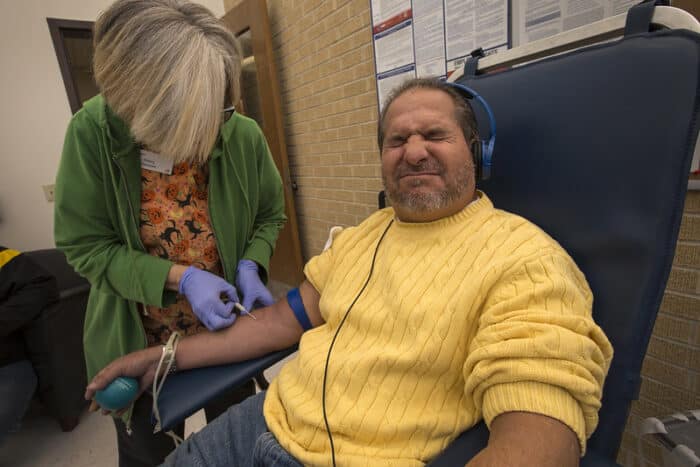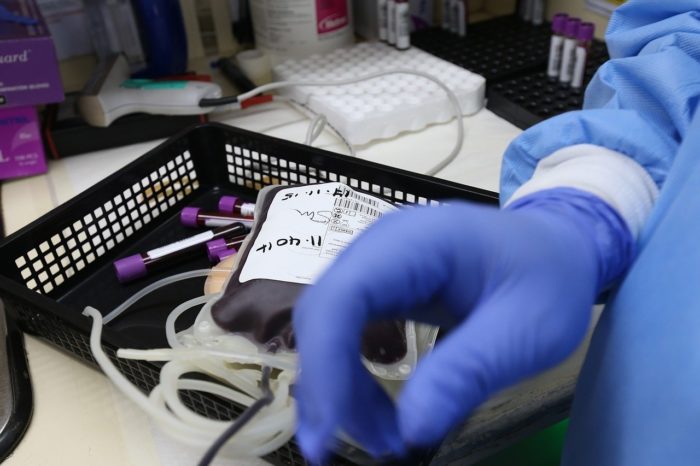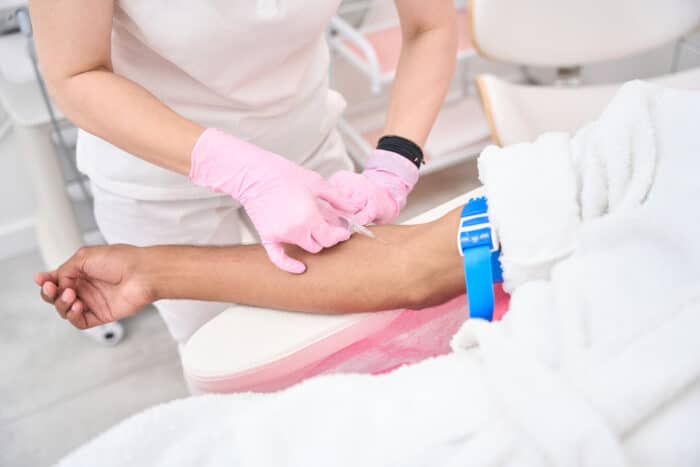If you’re an aspiring phlebotomist or just someone who is interested in the career, you might have come across the terms ‘venipuncture’ and ‘phlebotomy’ used in the same space.
You might be confused if these terms are interchangeable or if they have different meanings and roles.
In this article, we will uncover just that. We will discuss the difference between venipuncture and phlebotomy, where each technician works, what educational requirements are needed to become each, and more.
Let’s get started.
Read: How to Become a Phlebotomist
What is Venipuncture?
Venipuncture, which is just a fancy way of saying “drawing blood from a vein,” is the way doctors and nurses get blood samples from you for different tests and medical stuff. If you’ve ever had your blood taken for tests, you’ve had a venipuncture.
A healthcare person, like a phlebotomist, finds a good vein, usually in your arm. They clean the area to keep it germ-free, put a needle in your vein, and the blood goes into a special sealed tube.
What is Phlebotomy?
Now, phlebotomy is a bit like the older sibling of venipuncture. Phlebotomy involves a wider range of tasks, not just drawing blood, but also handling blood samples, making sure they are properly labeled, and getting them ready for testing.
Phlebotomists don’t just draw blood from veins; they can also collect blood using methods like pricking a finger or heel (which is often done for newborns). They’re the ones who make sure the blood samples have the right labels and are all set to be tested.
Where Do They Work?
It’s really important to know where these skills are used, especially if you’re thinking about working in this field.
Drawing Blood from Veins (Venipuncture) is needed in different places in healthcare, like hospitals, clinics, and labs where they test blood. Basically, any spot that needs blood samples for checking or treating people will need people who can do venipuncture.
Phlebotomists work in the same places as those who do venipuncture, but they can also work in places where people donate blood or in research labs. Their job is not just taking blood; they also keep records and make sure blood stuff is handled safely.
Differences in Education and Training
If you’re thinking about becoming a person who draws blood from others, it’s important to understand what you need to learn.
For venipuncture, learning to take blood can be part of larger medical training, like becoming a medical assistant or a nurse. In these programs, you’ll get hands-on practice in safely drawing blood.
For phlebotomy, you will need to go through specific training programs, which can last from a few weeks to a few months. In these programs, you’ll learn how to collect blood and also how to handle it safely, keep it stored properly, and follow safety guidelines.
See: How Long Does it Take to Become a Phlebotomist
Differences in Responsibilities
Let’s also break down what these experts do in a simple way:
1. Venipuncture: A venipuncturist’s main job is to take blood carefully and precisely. They have to make sure the samples they collect are good quality and have the right labels on them.
2. Phlebotomy: Phlebotomists don’t just take blood; they also keep their work area clean and organized, manage records, and follow safety rules to keep blood samples safe and sound.

Do You Want To Become a Phlebotomist? Check Out Free Phlebotomist Masterclass!
In our masterclass you learn:
- How to be a Phlebotomist faster…in just 2 months!
- Avoid student debt & driving to classes
- #1 thing employers want from Phlebotomists
- How to stand-apart & get a university certificate for a strong resume
Conclusion
Two important jobs involve dealing with blood: venipuncture and phlebotomy. Venipuncture is when a healthcare worker takes blood from a vein. Phlebotomy includes more than just taking blood; it also involves collecting blood, processing it, and keeping records.
So, if you want to work with blood, you can either be the person who takes blood from veins or the one who manages the whole blood collection process. Both venipuncture and phlebotomy can lead to rewarding careers. It’s all about choosing the job that matches your interests and how much responsibility you’re comfortable with.
Related Resources:
Related Articles
-
How to Be Successful in College in 2022 – 7 Simple Tips to Succeed
-
How Do Scholarships Work? Read This First…Truth is Shocking
-
7 Best College Majors 2024: What Should I Major In?
-
How to Choose a College – 10 Things You Must Consider in 2024
-
Why Go to College? Top 13 Benefits for Adult Students in 2022
-
Top 5 Best Alternatives to Community College for 2024








